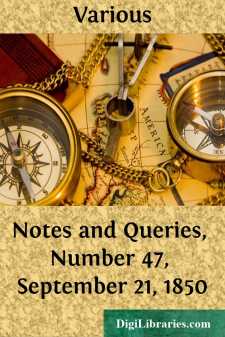Categories
- Antiques & Collectibles 13
- Architecture 36
- Art 48
- Bibles 22
- Biography & Autobiography 813
- Body, Mind & Spirit 142
- Business & Economics 28
- Children's Books 17
- Children's Fiction 14
- Computers 4
- Cooking 94
- Crafts & Hobbies 4
- Drama 346
- Education 46
- Family & Relationships 57
- Fiction 11829
- Games 19
- Gardening 17
- Health & Fitness 34
- History 1377
- House & Home 1
- Humor 147
- Juvenile Fiction 1873
- Juvenile Nonfiction 202
- Language Arts & Disciplines 88
- Law 16
- Literary Collections 686
- Literary Criticism 179
- Mathematics 13
- Medical 41
- Music 40
- Nature 179
- Non-Classifiable 1768
- Performing Arts 7
- Periodicals 1453
- Philosophy 64
- Photography 2
- Poetry 896
- Political Science 203
- Psychology 42
- Reference 154
- Religion 513
- Science 126
- Self-Help 84
- Social Science 81
- Sports & Recreation 34
- Study Aids 3
- Technology & Engineering 59
- Transportation 23
- Travel 463
- True Crime 29
Notes and Queries, Number 47, September 21, 1850
by: Various
Categories:
Description:
Excerpt
NOTES.
OLD SONGS.
I heard, "in other days," a father singing a comic old song to one of his children, who was sitting on his knee. This was in Yorkshire: and yet it could hardly be a Yorkshire song, as the scene was laid in another county. It commenced with—
"Randle O'Shay has sold his mare
For nineteen groats at Warrin'ton fair,"
and goes on to show how the simpleton was cheated out of his money.
I find in Hasted's History of Kent (vol. i. p. 468., 2nd edit.) mention made of the family of Shaw, who held the manor of Eltham, &c., and who "derive themselves from the county palatine of Chester." It is further stated that Randal de Shaw, his son, was settled at Haslington Hall in that county.
All, indeed, that this proves is, the probability of the hero of the song being also a native of Cheshire, or one of the adjacent counties; and that the legend is a truth, even as to names as well as general facts. The song is worthy of recovery and preservation, as a remnant of English character and manners; and I have only referred to Hasted to point out the probable district in which it will be found.
There are many other characteristics of the manners of the humbler classes to be found in songs that had great local popularity within the period of living memory; for instance, the Wednesbury Cocking amongst the colliers of Staffordshire and Rotherham Status amongst the cutlers of Sheffield. Their language, it is true, is not always very delicate—perhaps was not even at the time these songs were composed,—as they picture rather the exuberant freaks of a half-civilised people than the better phases of their character. Yet even these form "part and parcel" of the history of "the true-born Englishman."
One song more may be noticed here:—the rigmarole, snatches of which probably most of us have heard, which contains an immense number of mere truisms having no connexion with each others, and no bond of union but the metrical form in which their juxtaposition is effected, and the rhyme, which is kept up very well throughout, though sometimes by the introduction of a nonsense line. Who does not remember—
"A yard of pudding's not an ell,"
or
"Not forgetting dytherum di,
A tailor's goose can never fly,"
and other like parts?
It is just such a piece of burlesque as Swift might have written: but many circumstances lead me to think it must be much older. Has it ever been printed?
There is another old (indeed an evidently very ancient) song, which I do not remember to have seen in print, or even referred to in print. None of the books into which I have looked, from deeming them likely to contain it, make the least reference to this song. I have heard it in one of the midland counties, and in one of the western, both many years ago; but I have not heard it in London or any of the metropolitan districts. The song begins thus:—
"London Bridge is broken down,
Dance over my Lady Lea:
London Bridge is broken down,
With a gay ladée."
This must surely refer to some event preserved in history,—may indeed be well known to well-read antiquaries, though so totally unknown to men whose general pursuits (like my own) have lain in other directions....












